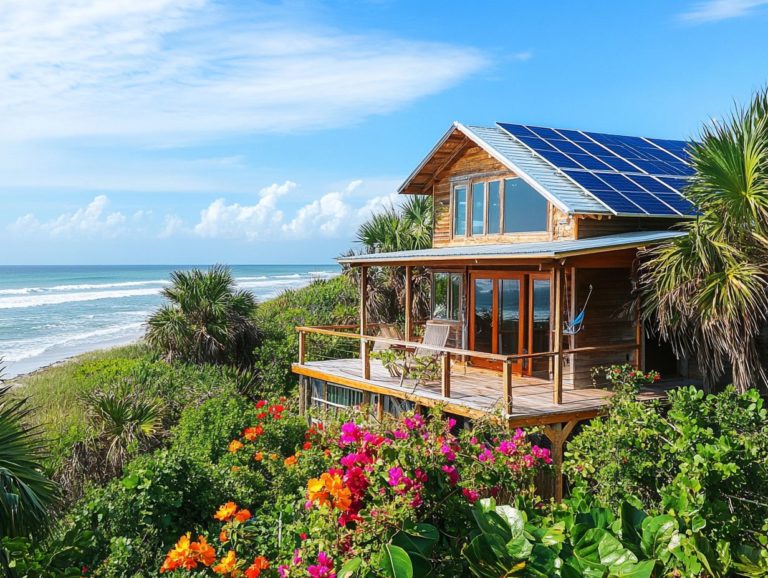Understanding Sustainable Tourism and Accommodation
Sustainable tourism transcends mere buzzwords; it embodies a movement dedicated to harmonizing the joy of travel with the vital preservation of our planet and its diverse cultures.
This article delves into the essence of sustainable tourism, revealing the myriad benefits it presents and highlighting the pivotal role of accommodation in this journey. You ll uncover insights into what constitutes a sustainable stay and practical tips to help you make responsible travel choices.
The article also highlights the challenges facing sustainable tourism and showcases initiatives that are forging a path toward a greener future. Discover how you can contribute to more mindful and eco-friendly travel experiences, enriching not only your adventures but also the world around you.
Contents
Key Takeaways:

- Sustainable tourism prioritizes the well-being of local communities, the environment, and cultural preservation. It involves responsible travel practices that benefit both the destination and the traveler.
- Sustainable accommodation goes beyond eco-friendly amenities and focuses on minimizing the negative impacts of tourism. It can include practices such as using renewable energy, supporting local businesses, and promoting cultural heritage.
- As tourists, we can support sustainable tourism by being mindful of our environmental impact, respecting local cultures and traditions, and supporting responsible businesses. Together, we can make a positive impact on the destinations we visit.
The Concept of Sustainable Tourism
Sustainable tourism represents a complete way to travel that aims to minimize ecological impact while enhancing the experiences of both travelers and local communities. This concept underscores the significance of responsible travel practices that foster wildlife conservation and celebrate cultural heritage, creating truly meaningful experiences for the discerning traveler.
By prioritizing eco-friendly options and championing green tourism, you can become part of an industry that actively contributes to environmental preservation and give the power to local communities, allowing them to flourish both economically and socially.
Defining Sustainable Tourism
Sustainable tourism is your passport to a travel experience that prioritizes the health of the environment and the well-being of local communities, all while ensuring the economic viability of the tourism industry.
This approach not only strives to minimize your ecological footprint but also seeks to support and enrich the cultures and economies of the places you visit. At its essence, sustainable tourism embodies principles such as reducing waste, conserving resources, and promoting cultural heritage values that resonate deeply with eco-tourism and responsible travel.
Eco-tourism, or travel that focuses on protecting nature, zeroes in on natural environments, emphasizing the importance of conservation and biodiversity, while responsible travel encourages you to make thoughtful choices that honor local customs. By integrating comprehensive environmental policies, sustainable tourism guides and promotes practices that ensure both the planet and the communities serving as its hosts reap the benefits.
Benefits of Sustainable Tourism
The benefits of sustainable tourism are truly remarkable, ranging from the protection of local ecosystems and wildlife to the enhancement of cultural heritage and the local economy, ultimately leading to a more enriching travel experience for you.
One significant advantage is how it empowers residents to earn income while inviting you to engage directly with their unique culture. Take Costa Rica, for instance, where eco-tourism has created over 50,000 jobs, making a meaningful impact on rural communities.
Sustainable practices also play a vital role in preserving cultural heritage by promoting traditional crafts and local customs that might otherwise fade away in the face of mass tourism. Communities that adopt these methods often experience a reduction in the ecological footprint of tourism, resulting in healthier environments.
According to a study from the United Nations World Tourism Organization (UNWTO), eco-friendly practices can cut a destination’s carbon footprint by up to 75%, illustrating the effective harmony between tourism and conservation. Join the movement towards sustainable tourism today and help protect our planet while creating unforgettable memories!
Sustainable Accommodation
Sustainable accommodation is a game changer for responsible travel. By offering eco-friendly options, it allows you to prioritize environmental sustainability, support local economies, and immerse yourself in unique experiences through community-based tourism.
What Makes Accommodation Sustainable?

Sustainable accommodation uses eco-friendly practices designed to minimize waste and lessen environmental impact while ensuring your comfort and convenience as a traveler.
These establishments evaluate their energy efficiency through advanced technologies like solar panels and energy-efficient appliances, effectively lowering their carbon footprint the total amount of greenhouse gases emitted by activities and cutting down on utility costs.
Waste reduction strategies, such as composting organic materials and embracing recyclables, are integral to their commitment to sustainability. By working with local communities sourcing food locally and employing residents these accommodations not only drive economic benefits but also strengthen social ties.
This approach aligns perfectly with the principles of green tourism, fostering a harmonious relationship between you and the destinations you explore.
Consider eco-lodges set in breathtaking natural landscapes as prime examples of sustainable accommodations. These places often harness renewable energy sources and prioritize environmental stewardship, showcasing that luxury and sustainability can indeed coexist in perfect harmony. To delve deeper into this topic, check out the article on understanding the concept of sustainable destinations.
Examples of Sustainable Accommodation
Sustainable accommodation options are abundant around the globe, from eco-lodges tucked away in the Amazon and South Africa to heritage hotels in England. You ll find a variety of responsible tourism offerings on platforms like Airbnb and Couchsurfing that truly prioritize sustainability.
These accommodations do more than just reduce their carbon footprint; they also boost local economies by sourcing food and materials from their communities. For instance, eco-lodges often incorporate solar energy and water conservation systems, showcasing designs that blend seamlessly with the natural surroundings.
On the other hand, heritage hotels embrace local architecture and culture, preserving history while delivering a one-of-a-kind experience to travelers.
By choosing to support women-owned businesses, you not only enrich your own journey but also contribute to gender equality and empower female entrepreneurs. When you opt for these sustainable choices, you play a crucial role in promoting responsible tourism practices, ensuring that future generations can explore and cherish the planet s diverse ecosystems.
Sustainable Practices for Tourists
Embracing sustainable practices while traveling is crucial for the conscious traveler who seeks to make responsible choices that leave a positive mark on local communities and the environment.
How Tourists Can Support Sustainable Tourism
You have the power to support sustainable tourism by making thoughtful choices that prioritize local businesses, connecting with residents, and engaging in volunteer projects focused on community development.
By choosing eco-friendly accommodations that harness renewable energy and promote sustainable practices, you’ll significantly reduce your environmental footprint. For example, when you stay at a locally-owned boutique hotel, not only are you contributing to the local economy, but you’re also setting the stage for a more authentic experience.
Engaging with local artisans by purchasing handcrafted souvenirs or taking part in workshops offers you a glimpse into the area’s rich cultural heritage while ensuring profits stay within the community. You might also explore community-based tourism initiatives, allowing you to immerse yourself in local traditions, participate in conservation efforts, or lend a hand with educational programs.
In doing so, you create a lasting, positive impact on both the environment and the wonderful people you encounter along your journey.
Responsible Travel Tips
Responsible travel tips are invaluable for conscious travelers like you. They enable eco-friendly choices that minimize waste and support cultural preservation during your journeys.
By embracing these practices, you can leave a positive mark on the environments you explore and the communities you encounter. One vital tip is to carry a reusable water bottle and shopping bag. This not only reduces plastic waste but also conveys respect for local resources.
It’s essential to understand and honor cultural norms. Taking the time to learn a few local phrases or customs demonstrates your appreciation for the heritage of the area. Opting for local accommodations and supporting small businesses fosters economic sustainability while enhancing your travel experience and promoting responsible tourism.
Challenges and Solutions for Sustainable Tourism

Despite its many advantages, sustainable tourism presents various challenges that you must navigate. The negative impacts of mass tourism on local communities and ecosystems are significant. It’s essential for you to engage in proactive conservation efforts and seek innovative solutions.
Obstacles to Sustainable Tourism
Obstacles to sustainable tourism encompass a range of challenges. These include greenwashing (false claims about environmental benefits), ineffective environmental policies, and the negative impacts tourism can have on local communities and ecosystems.
These challenges undermine the authenticity of sustainable initiatives and create confusion for travelers like you who genuinely wish to make a positive impact. When companies engage in greenwashing, they mislead you into believing their practices are environmentally friendly, eroding trust in genuine sustainability efforts.
Local communities often bear the brunt of tourism-related issues, such as overcrowding and resource depletion. This leads to deteriorating living conditions and cultural dilution. The ramifications of these hurdles extend beyond immediate environmental degradation; they can provoke socio-economic disparities that further alienate local populations. This complicates the delicate balance between tourism growth and community well-being.
Initiatives and Solutions
Innovative initiatives and solutions are crucial for you to navigate the challenges of sustainable tourism. They concentrate on conservation efforts and empowering communities to achieve a more harmonious tourism landscape through community-based tourism.
These exciting strategies are transforming how local communities connect with travelers. They nurture a profound appreciation for their natural and cultural heritage while promoting ethical tourism.
For example, when eco lodges collaborate with indigenous groups, they create unique cultural experiences. These not only invigorate the local economy but also safeguard traditional practices and cultural preservation.
Look at case studies from places like Costa Rica. Community-based projects focus on reforestation and wildlife conservation, demonstrating significant benefits for biodiversity. This enhances the overall visitor experience and supports local artisans.
Various governments are adopting policies that prioritize sustainable practices. They establish a framework that promotes responsible tourism and protects fragile ecosystems while addressing the impact of tourism for generations to come.
Frequently Asked Questions
What is sustainable tourism?
Sustainable tourism is a form of tourism that focuses on minimizing negative impacts on the environment, economy, and local communities. It provides long-term benefits for these areas through eco-friendly practices.
Why is understanding sustainable tourism important?

Understanding sustainable tourism is important to preserve natural resources, protect local cultures, and promote economic growth responsibly. Act now to ensure a greener future for coming generations!
Join us in making a difference! Start your responsible travel journey today.
What is sustainable accommodation?
Sustainable accommodation refers to lodging that practices eco-friendly methods like conserving energy and water. It also focuses on reducing waste and supporting local communities and food sources.
How can I find sustainable accommodation?
You can find sustainable accommodation in various ways. Look for eco-friendly certifications, read traveler reviews, and support locally owned options like Airbnb and women-owned businesses.
What are the benefits of staying in sustainable accommodation?
Choose sustainable accommodation to make a real difference for the planet and enjoy an unforgettable travel experience! These places often provide unique cultural experiences and support sustainable tourism initiatives.
What can I do to be a responsible and sustainable tourist?
As a conscious traveler, support sustainable tourism by choosing eco-friendly activities and staying at responsible places. Always respect local cultures, minimize waste, and educate yourself about your destination’s customs and environment.






